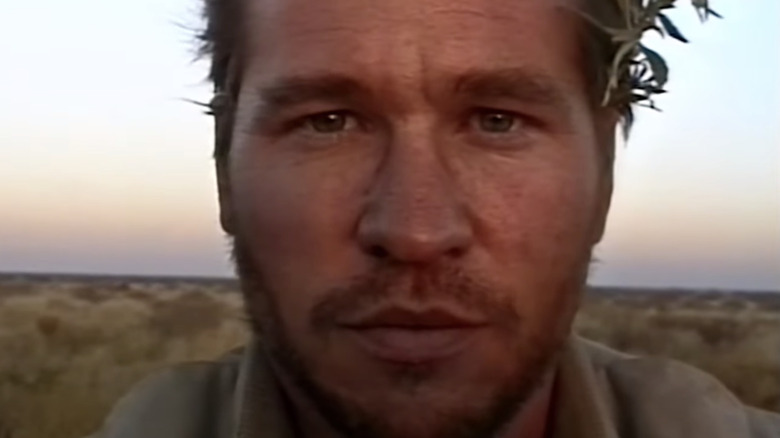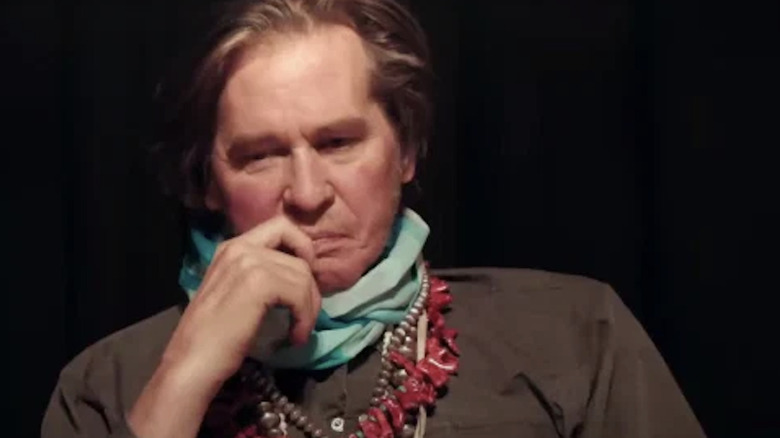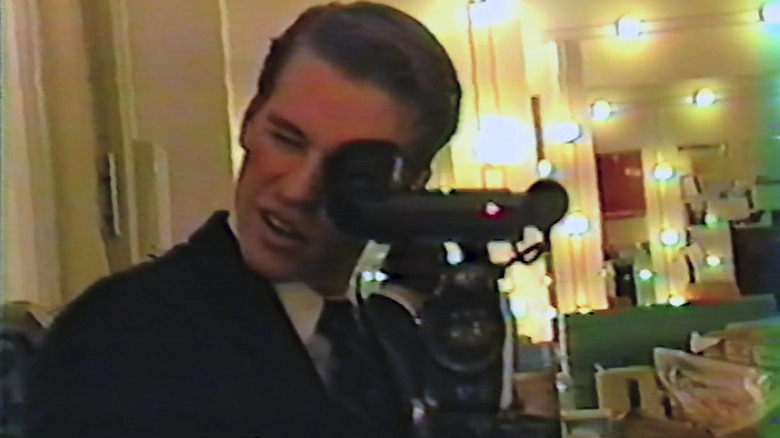Val Review: Batman Beyond
In the closing credits for "Val" — a heartbreaking, fiercely creative documentary telling the hard-luck story of a Hollywood star whose life has taken some tough turns — there is a quick shot of Val Kilmer butt naked, standing in a babbling stream with nothing but a video camera on his shoulder. It's a good symbol for the movie itself, which has the onetime "Batman" megastar baring everything, choosing to pursue a life of art over a career of artifice.
The shot is one of many presented over an odd little song about the joys of being a cinematographer — and Kilmer is that in this film, along with producer and of course, subject. If it has been a minute since you've given Val Kilmer much thought, you can be forgiven — his last widely-seen film arrived more than a decade ago, and since 2015 he has been undergoing treatment for throat cancer, including a procedure on his trachea that has significantly altered his ability to speak, and in the time since he has been below the radar, if not altogether (quite literally) out of the picture.
But the saving grace for Kilmer at the moment (and film fans in general) is that he recalls being the first among his friends to have a video camera. We watch him visit a storage facility, where he has stored thousands of hours of film, and this decades-long love affair with the lens has yielded a treasure trove of personal moments and priceless behind-the-scenes footage (much of which is people asking Kilmer to put his camera down) featuring some of the most famous films of the '80s and '90s.
There's plenty of footage of Kilmer's youth as well, because as it turns out, Kilmer wasn't always the most artistically minded member of his family. That designation went to his younger brother Wesley, an aspiring filmmaker who shot breezy backyard remakes of "Jaws" and "Batman" movies with his siblings (who were inspired after visiting the set of Adam West's "Batman" series as children). Wesley, who had epilepsy, drowned in the family jacuzzi at the age of 15 — a tragedy that still haunts Val, now north of 60.
Since the star can barely speak — in order to do so, he needs to hold a finger over the tube surgically inserted into his neck to aid breathing — his son Jack narrates the film as Val Kilmer, a sweet touch that is also effective because the two sound alike. Kilmer has clearly had some difficulties in life and made decisions he'd like to take back — he honestly recounts them throughout the documentary — but one thing he did right was forge a bond with Jack that is enviable for any parent. The two seem like friends, co-conspirators, and co-survivors with a delightfully irreverent outlook on life that has galvanized them as Jack has become the caregiver.
Looking back
That's what a lot of "Val" feels like, intimate home movies, albeit ones that just happen to feature Sean Penn, Kurt Russell, Kevin Bacon, and other stars, forever crystallized in the prime of their superstardom. But not only does Kilmer have a treasure trove of footage featuring Penn and Bacon mooning the camera, but he also presents behind-the-scenes footage of "Norm," the lookalike brought in to the legendarily disastrous 1996 film "The Island of Dr. Moreau." Kilmer took the part to act alongside his hero Marlon Brando, but Brando's overbearing presence quickly got the "On the Waterfront" legend ushered off set for large periods of time, leaving Kilmer to act with ... well, Norm.
The unflinching "Val" has Kilmer addressing long-simmering allegations that he's "difficult to work with," his argument essentially boiling down to a love of the craft and insistence that collaborators treat it with respect. The old clips portray an actor who yearns to act, but too often finds himself wearing batsuits. To bolster his case, he puts in audio footage of an on-set argument with "Moreau" replacement filmmaker John Frankenheimer (who was also threatening to quit), and looks back on 1995's "Batman Forever" saying: "Every kid dreams of becoming Batman. Nobody should dream of playing him in a movie."
Kilmer walks the viewer through his acting background (he was the youngest person ever accepted into the Juilliard drama division at the time) and subsequent stage career, leading to an unlikely film debut in 1984's Abrams-Zucker-Abrams cult classic "Top Secret!" — a film he claims to still not understand. Kilmer took the role so seriously, he spent months learning to play guitar, but when he showed up to set, the directors told him it was funnier when he pretended he didn't know how to play. As it turns out, the anecdote would be a microcosm for his time in Hollywood.
We see the heartbreakingly desperate audition tape Kilmer made for films like "Full Metal Jacket" (he even flew to London to try and hand-deliver it to director Stanley Kubrick), interspersed with him on set, goofing around in trailers with his "Top Gun" and "Willow" co-stars. On the latter, he would find the love of his life, actor Joanne Whalley, to whom he was married from 1988 to 1996.
Kilmer admits, straight up, that the divorce from Whalley left him bankrupt. This wasn't the first time, as he had previously given power of attorney to his would-be land maven father in the '80s, who allegedly attached his son's name to shell companies with the intention of avoiding taxes. All of this returns us to the modern-day image of Kilmer, an often heartbreaking character who doesn't want your sympathy, traveling around the country attending screenings of his old films, signing autographs at comic conventions and pausing only to vomit from the effects of chemotherapy.
On the other side of the camera
Under most circumstances, "Val" could be a tough watch. But in his final leading man years, Kilmer discovered the role he considers to be his greatest, a one-man show of Mark Twain under heavy prosthetics. He still thinks of Twain as a kindred spirit (they both lost key people in their lives when they were young), and was on the verge of taking the Twain act bigger when one day, he lost his voice and began coughing up blood. In the time since, Kilmer has embraced making art at home, hosting a studio that gives young artists a place to display, and sharing newfound bonds with his son, as well as his daughter Mercedes.
But of course, his memories are also the collective memories of the filmgoers who spent decades watching him. So when a cleverly edited montage shows how effectively Kilmer replicated Jim Morrison's every last stage mannerism, it's one final opportunity to marvel at the performance. Unseen footage from the set of the Michael Mann classic "Heat" is like manna from heaven. When Kilmer tells us that he insisted the makers of "Tombstone" fill Doc Holliday's deathbed with ice cubes so the actor could properly convey the level of discomfort his character was feeling at the end of the film, it's one last chance to marvel at his dedication to a craft that too often left him disappointed.
"One of the things they buy for all that money," he confesses into the camera at a contemplative low point, "is your life for a period of time."
Kilmer clearly feels some level of shame these days, as he goes around to conventions selling memories of when he was a young, handsome leading man; at one point, he seems to apologize for it. But at this stage in his life, you can tell how much it means to have a line of people come over, shake his hand, and say how much they love "Thunderheart." He's playful with the fans, he steals their caps and poses for selfies, and contrasted with old footage of him looking alone, lost and miserable on the set of a film like "The Ghost and the Darkness," it seems like he has finally found his peace.
"I've tried to see the world as one piece of life," Kilmer says, looking to the future with a spiritual belief there is more to come.
Selfishly, as a film fan, it would have been nice to see more from movies like 2002's "The Salton Sea," 2003's "Wonderland," 2004's "Spartan" and 2005's "Kiss Kiss Bang Bang," an excellent late-career run with solid Kilmer performances that paired him with the likes of Shane Black, David Mamet, Carrie Fisher, Robert Downey Jr. and Vincent D'Onofrio, similarly eccentric but frequently brilliant artists who seem likely to have been more sympathetic to Kilmer's struggle. Almost everything after 1997's "The Saint" is lumped into one big montage of Kilmer's later works, tossed off as though they aren't worth mentioning.
But of course, ultimately a person's story is his own to tell, and with the help of directors Ting Poo and Leo Scott, "Val" tells an impossibly, impressively honest one. Will Val Kilmer ever be a movie star again? In his own words, he has already "lived a magical life," and this ultimately uplifting film depicts an artist who has finally transcended the need to be anybody's wingman.


